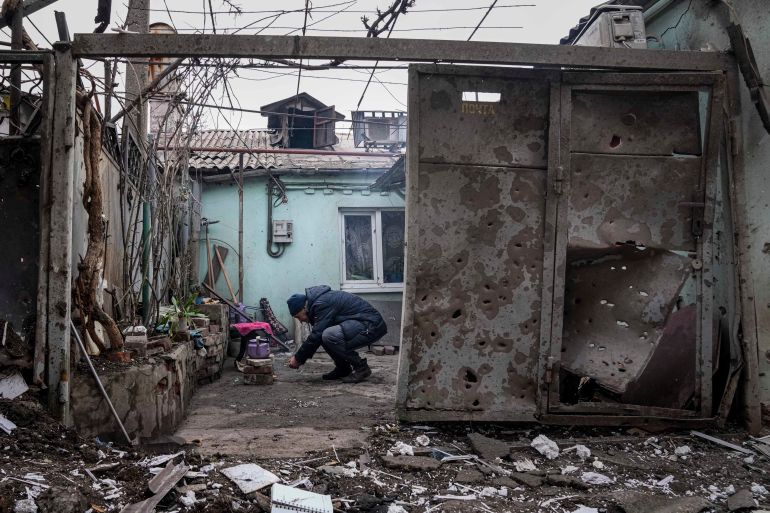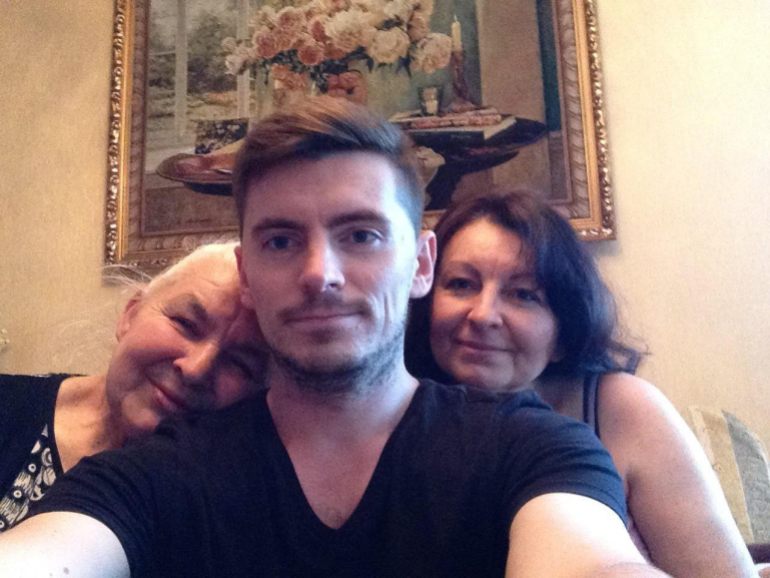Anguished Ukrainians await news of relatives in besieged Mariupol
Communications with civilians in the Ukrainian port city have been cut off for the past week amid Russian shelling.

Roman Skliarov woke up on February 24 to a phone call warning that war had started. In the distance, he could hear the sound of explosions and heavy fire as Russian troops advanced towards the port city of Mariupol, in southeastern Ukraine.
The 32-year-old rushed to wake his mother and younger brother, who tried to calm him down as he flung a few essential items into a backpack.
Keep reading
list of 3 itemsIs Russia’s invasion of Ukraine going to plan for Moscow?
‘Apocalyptic’: Ukraine crisis worsens as Russia ramps up attacks
“It took me two hours to convince them to leave,” Skliarov, who had returned from a stint working in the casino of a cruise ship four days prior, told Al Jazeera. “Had I not been there, I don’t know if they would have left.”
Skliarov and his brother and mother are now staying with relatives in the capital, Kyiv.
But his grandmother, 77-year-old Anna Skliarova, could not be persuaded to flee her home. The family begged and pleaded, but she adamantly refused to leave her city and the house containing her most treasured memories.

The last time she answered the phone was on March 1. The pharmacy where she worked as a volunteer, distributing medicines to those in need, had shut down and she had stayed home.
She worried looters would break into the house Skliarov and his relatives had vacated and assured them she would divide her time between the two homes to deter intruders.
“[On March 5], I was scrolling through Twitter and I see a video of my house on fire,” Skliarov said.
There was no indication of when the footage was taken, whether before or after he lost contact with his grandmother. Civilians in Ukraine’s southeastern coastal city of Mariupol have not been able to charge their phones since March 2, when the electrical grid was damaged as Russian forces surrounded the city.
A Russian shell reportedly hit the last functioning mobile phone tower in Mariupol on March 6, making communication nearly impossible.
Humanitarian conditions are reportedly growing more desperate by the day. Mariupol has been without water, heat, functioning sanitation systems or phone connections for the past week, with bodies lying uncollected on the streets and residents relying on streams or melting snow for drinking water. Continued shelling has also prevented repairs to damaged heating and water infrastructure.
Russian air strikes destroyed a children’s hospital in Mariupol on Wednesday, according to Ukrainian officials.
City authorities say hundreds of civilians have been killed during the fighting, though the full extent of civilian casualties and damage to the city is unknown due to the continued shelling and limited communications.
Repeated attempts to establish a humanitarian corridor in the past few days have collapsed under renewed shelling. An estimated 200,000 people – nearly half the population of 430,000 – are hoping to flee the city.
The deputy mayor of Mariupol told the BBC that Russian forces continued to pound areas where people were trying to gather ahead of being taken out. He said some roads were blocked, while others were mined.
Russia made fresh commitments to provide six humanitarian corridors on Wednesday, including from the city of Mariupol. Both Russia and Ukraine said they would “observe a regime of silence” from 07:00 GMT to provide safe passage from Kyiv, Chernihiv, Sumy, Kharkiv and Mariupol. People from Enerhodar and Mariupol were to be brought to Zaporizhzhia, in southeastern Ukraine.
Meanwhile, anguished relatives await to know the fate of their loved ones.
On Twitter, some shared the names of those still trapped in Mariupol in a last-ditch attempt at obtaining information.
My friend’s mother is also in #Mariupol. She was with friends. Late 60s. Surname: #Bachurina. Worryingly, the family lost contact days ago. We are hoping & praying for news soon. Sending love to all. 🇺🇦🙏🏼 pic.twitter.com/YGGPQkKRbr
— Lauren Catherine (@l_eley87) March 7, 2022
Amid the bewilderment at what has happened to his hometown and gut-wrenching concern for his grandmother’s wellbeing, Skliarov has only one certainty left.
“Even if she could flee, she would not do it,” he said.
“The memories of her whole life – of her husband – all her memories are there. For her, it’s impossible to leave.”